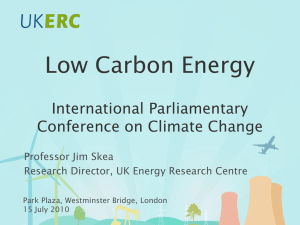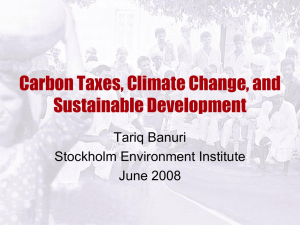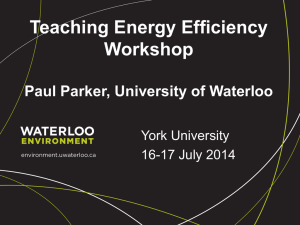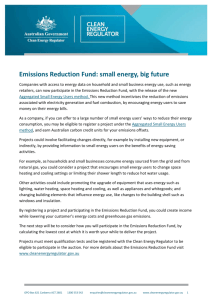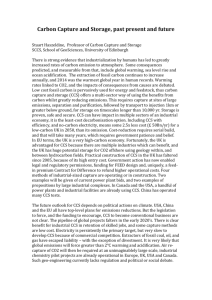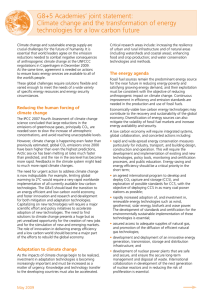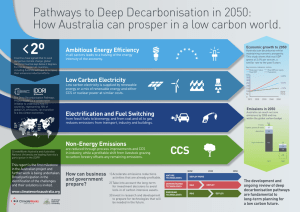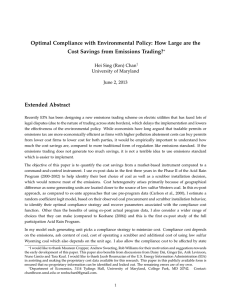Rationality and Objectivity in Science and Policy
advertisement
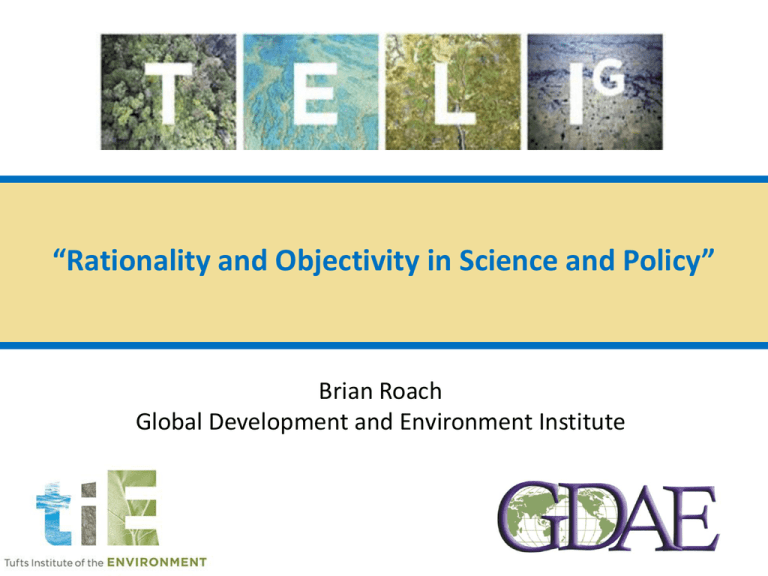
“Rationality and Objectivity in Science and Policy” Brian Roach Global Development and Environment Institute Strange but True? “From 2000 to 2006 carbon emissions grew at a faster rate in the European Union than in the United States” - U.S. ambassador to France, 2008 Totally True United States Emissions 2000 Emissions 2006 Percent Change EU-27 5,864 4,121 5,908 4,321 +0.8% +4.8% Source: U.S. Energy Information Administration, Department of Energy A More Complete Analysis 7000 Emissions (MMT) 6000 5000 4000 3000 2000 1000 0 1990 1995 2000 2005 Year Source: U.S. Energy Information Administration, Department of Energy 2010 Totally True, but Totally Misleading Year Range 2001-2007 United States +5.7% EU-27 +4.6% 2001-2005 +4.0% +2.6% 1999-2005 +5.5% +5.5% 1995-2006 +10.9% +6.6% 1990-2006 +17.3% +3.0% Source: U.S. Energy Information Administration, Department of Energy Objectivity in Science and Policy • Positive vs. Normative Analysis • Values vs. Bias • Disciplinary Bias vs. Humility The economic view on climate change “As economists, we believe that global climate change carries with it significant environmental, economic, social, and geopolitical risks, and that preventive steps are justified. Economic studies have found that there are many potential policies to reduce greenhouse-gas emissions for which the total benefits outweigh the total costs. The most efficient approach to slowing climate change is through market-based policies. The United States and other nations can most efficiently implement their climate policies through market mechanisms, such as carbon taxes or the auction of emissions permits. The revenues generated from such policies can effectively be used to reduce the deficit or to lower existing taxes.” “The Economists’ Statement on Climate Change,” March 1997 (signed by over 2,500 economists, including at least a dozen Nobel Prize-winners). Tax Bads, Not Goods (Green Tax Shifting) Increase taxes on negative externalities (e.g., burning fossil fuels) based on their social costs. Lower other current taxes such that the overall effect is revenue neutral. "Cutting income taxes while increasing gasoline taxes would lead to more rapid economic growth, less traffic congestion, safer roads, and reduced risk of global warming—all without jeopardizing long-term fiscal solvency. This may be the closest thing to a free lunch that economics has to offer.“ – N. Gregory Mankiw, chair of the Council of Economic Advisers under G.W. Bush, economic adviser to Mitt Romney Tax Bads, Not Goods (Green Tax Shifting) Then, three main questions : 1.How high should the tax be? 2. What taxes should be lowered to compensate? 3. What should be done with the revenue? Social Cost of Carbon A tax of $100/ton carbon equates to an increase of $0.27 per gallon of gas. Cost of Carbon Reduction Euros / Ton 100 50 Carbon capture and storage (CCS); new coal Medium-cost forestation Cofiring biomass Wind; low penetration Industrial feedstock substitution CCS, enhanced oil recovery, new coal Low-cost forestation Livestock Nuclear Biodiesel Waste Coal-to-gas shift Industrial CCS; coal retrofit CCS Industrial motor systems Avoided deforestation 0 -50 -100 -150 Standby losses Sugarcane biofuel Fuel efficiency in non-commercial vehicles Water heating Air conditioning Lighting systems Fuel efficiency in commercial vehicles 5 10 Total cost is only 0.4% of global GDP in 2030. 15 Building Insulation Billion Tons CO2 Equivalent 20 25 Scientific Consensus January 16, 2015: NOAA and NASA announce that 2014 was warmest year on record. All 13 of the warmest years on record have occurred in the last 15 years. The chance of this happening randomly is 1 in 27 million. (Source: The Washington Post) Climate Change Survey Results Source: Pew Research Center Behavioral Economics and Irrationality Behavioral economics: the study of psychological, social, cognitive, and emotional factors on economic decision-making. • anchoring effects (the influence of SS numbers on willingness to pay) • framing effects (penalty for late registration [93%] vs. discount for early registration [67%]) • availability heuristics (impact of an atypical video evaluation on willingness to take a class) Video with Dan Ariely: https://www.youtube.com/watch?v=9X68dm92HVI Some Applications to Climate Change: What Not To Do • Don’t use the word “tax”! (65% of Republicans were willing to pay a “carbon offset” vs. 27% a “carbon tax”) • Fear tactics will tend to backfire • Labeling products as “eco-friendly” will deter adoption among some groups • Monetary incentives that encourage better individual behavior may “crowd out” the collective sense of civic responsibility that is necessary Some Applications to Climate Change: What To Do “Behavioral research over the past 30 years strongly suggests that attention-catching and emotionally engaging informational interventions may be required to engender the public concern necessary for individual or collective action in response to climate change.” – Elke Weber, Climate Change 1: 332-342, 2010. • People want to be better than average (energy bill comparison data) • Token incentives can be surprisingly effective • Present efficient choices as defaults (new home options) • People prefer standards over economically efficient approaches (fuel economy and appliance standards) • Provide immediate feedback on energy use
